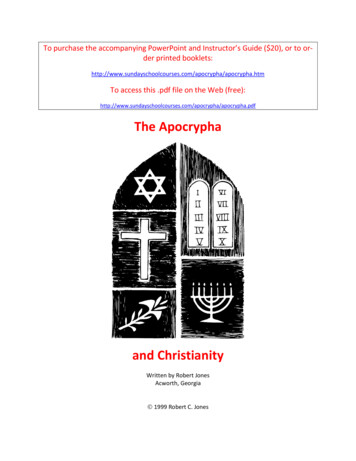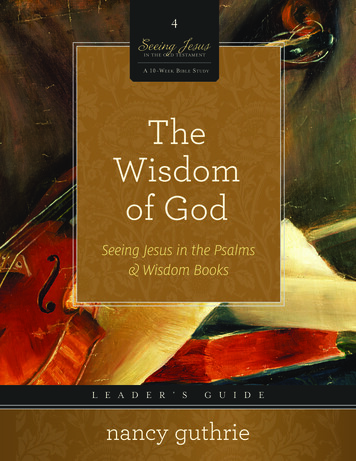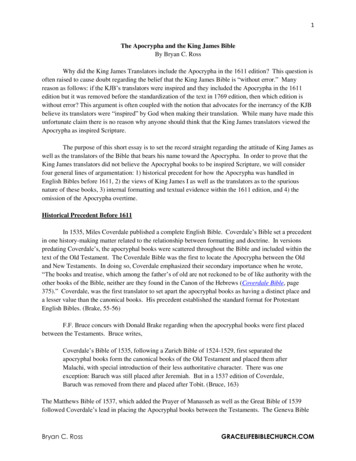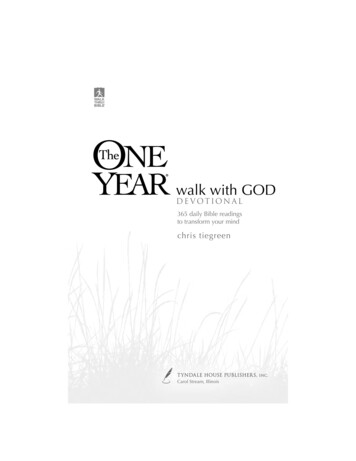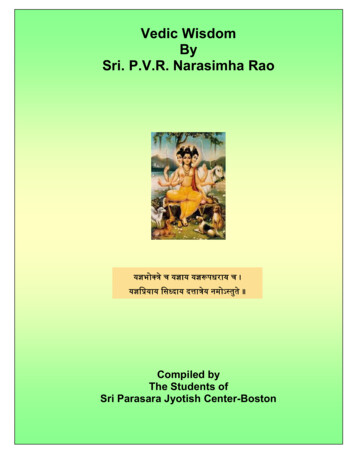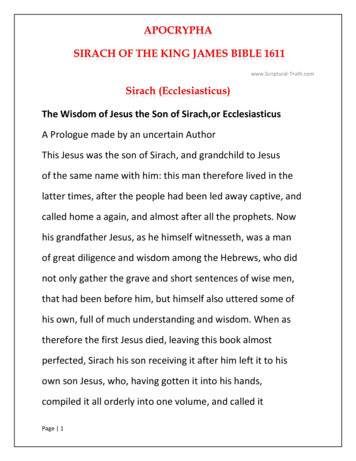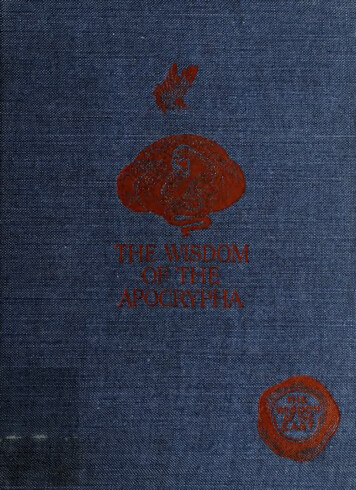
Transcription
\\\-yncf;o,/ /.: V / '*'-N. ///s*// 4)r I-4-y 'jCv ./BS 1753 .L3 1910Bible.The wisdom of the Apocrypha
Digitized by the Internet Archivein 2018 with funding fromPrinceton Theological Seminary phOOunse
xyXTbe TOtsbom of tbe East SeinesEdited byL. CRANMER-BYNGDr. S. A. KAPADIATHE WISDOM OF THEAPOCRYPHA
EDITORIAL NOTE''HE object of the Editors of this series is aJL very definite one. They desire above allthings that, in their humble way, these booksshall be the ambassadors of good-will and under standing between East and West—the old worldof Thought and the new of Action. In thisendeavour, and in their own sphere, they arebut followers of the highest example in the land.They are confident that a deeper knowledge ofthe great ideals and lofty philosophy of Orientalthought may help to a revival of that true spiritof Charity which neither despises nor fears thenations of another oreed and colour. Finally,in thanking press and public for the very cordialreception given to the “ Wisdom of the East ”Series, they wish to state that no pains havebeen spared to secure the best specialists forthe treatment of the various subjects at hand.L. CRANMER-BYNG.S. A. KAPADIA.Northbrook Society,185 Piccadilly, W.
WISDOM OF THE EASTTHE WISDOM OF THEAPOCRYPHAWITH AN INTRODUCTION BY C. E. LAWRENCEAUTHOR OF “ PILGRIMAGE,” ETC.LONDONJOHN MURRAY, ALBEMARLE STREET, W.1910
ToA. W. E.&L. C. B.
CONTE N T SPAGEIntroduction7.The Wisdom of Solomon19Ecclesiasticus .385
NOTERevised Version of the Apocrypha has beenused in this volume hy the kind permission ofthe Delegates and Syndics of the UniversityPresses of Oxford and Cambridge. Owing torigid limitations of space, some deletions havebeen necessary.These are, principally, thelast nine chapters of The Wisdom of Solomon,consisting of historical illustrations, and there fore quite well spared ; and in Ecchsiasticuschapters xxxv., xxxvi., and from xliv. 10 to1. 21. The design on the cover is the workof Mr. Edward Frampton, whom I am gladto thank.C. E. L.The6
THE WISDOM OF THEAPOCRYPHAINTRODUCTIONIt is, comparatively speaking, so little a while sincethe Bible was the unfailing source of human comfortand inspiration, that the indifference with which,in recent years, it had come to be regarded by themany, must needs have brought disquieting thoughtsto the few. In the days of our grandparents, andfor five centuries before that, the Bible was, at once,the fount of divine wisdom, the sure depository oftruth for the faithful, an impregnable rock ; andso firmly was its influence established, that all thecontrary efforts of the times could not weaken ordiminish its power for strengthening and comfortingthe hearts and minds of believing men.Then,in perhaps a natural process—for reasons I will notin this connection endeavour to suggest, though theyare evident enough to whosoever would seek them—the old power of the scriptures seemed gradually tofade. The Bible became less the personal companion,and more a sideboard ornament; if, indeed, it was7
8INTRODUCTIONnot merely an impediment on the shelf of theforgotten.Then time again wrought change, ahopeful change. The scholarly study and criticismgiven to the book during the last twenty to thirtyyears, helped by well-organised and wonderfully wellrewarded archaeological research, have had, withother tendencies, this effect. They re-established theauthority of the scriptures, and reintroduced themto thoughtful minds; not quite, perhaps, as in theold uncritical days, but with the living force andauthority of an immortal literature.The Biblebecame no longer—or should I say, not merely P—amystical touchstone, a magical entity ; but a richcollection of national writings, containing, as it does,a series of human documents of unsurpassable value—history, law, philosophy, politics, prophecy, poetry,proverbs, and allegories—which had for the centuriesof its evolution and creation, and have for thesedays and the years to come, inspiration and messageswhich, when sought and realised, must inevitablyrouse, raise, and instruct the energies and thoughtsof mankind.It is as such—as human documents reflecting theideals and the philosophy of eastern wisdom—thatthis selection of two of the Apocryphal books of theOld Testament has been included in the 44 Wisdomof the East ” series. Regarded as human documents,there can be no question of their great interest andvalue. The Wisdom of Solomon and Ecclesiasticusfollow naturally after, and are not unworthy torange with, The Proverbs and Ecclesiastes ; althoughnot for an instant would one claim for them equality
INTRODUCTION9of excellence with those accepted parts of the Canon.Nevertheless, the neglect of the Apocryphal writingshas meant a loss, unjustifiable ; for they carry onthe literature, and generally illustrate the ethicalattitude, of the Jews, during the gap of years whichlapsed between the last books of the Old Testamentand the Synoptic Gospels, and are in many respectsunique.For our purposes they have a necessary message.The truths they tell, the criticism of men and thingsthey make, are as applicable to modern life as arethe extremely acute generalisations of The Proverbs.They spur, chide, stimulate, promise reward to, andinspire, the wise and the prudent of these days, asthey did the people of the times wherein they werewritten. The world is, after all, intensely conserva tive. The changes wrought by humanity inevitablywork in cycles, and come back to points passed, days,years, ages before. There is, indeed—so we cometo the over-quoted aphorism of Solomon—nothingnew under the sun. Man in his vanities, his littlepride, his temporary strength, his abundant weak ness, is the same creature precisely—for whatessential difference do modern rules and trappingsreally make ?—as he was when the sun looked downon Hocks and herds in the pleasant pastures ofPalestine, where now are wearying rocks and blister ing sand ; as he was when the harp of David, thedrums and trumpets of Sennacherib, the war-cries ofthe Maccabees, challenged the hills and valleys ofJudaea for a little while, and then were still. Vanityof vanities, vanity of vanities, all is vanity ! The
10INTRODUCTIONunknown writer of The Wisdom of Solovion inmeasure echoed and carried on that humbling, eternaltruth ; so, too, though with still slighter voice, didJesus the Son of Sirach, who, sometime in the twoto three hundred years preceding the dawn of theChristian era, wrote this generally neglected wisdombook, Ecclesiasticus.But, besides the vanity ofman, these sages also spoke, even though vaguely, ofthe hope which waited on him. That is not to beforgotten.It is necessary before noticing the general messageand appeal of these wisdom-books to revert briefly tothe question of the particular place and value of theApocrypha as compared with some of the canonicalbooks of the Old Testament. This is not quitewhere it was. It is worth while to realise that. Thehigher criticism, as it is called, by subjecting thescriptures to the wholesome test of educated andscientific inquiry, has modified the comparative valueof its component parts. Some it has illumined andstrengthened ; others it has proved to be of differentvalue from that previously ascribed to them. Dreamsand visions, allegories and parables, are the reasonableand helpful explanations of certain supernaturalsigns and wonders in the Old Testament, the literaltruth of which, though hampering and perplexing tomany believers of scriptural truth, would have beenfiercely maintained and stoutly defended by the Bunyantype of religious warrior—and honour be to every manin that fighting company ! Be that as it may, theresults of the higher criticism have brought intoprominence this fact, that the action of St. Jerome
INTRODUCTION11in shelving the Septuagint and retranslating theOld Testament from the original Hebrew, therebyexcluding the Apocrypha from the place it hadhitherto occupied witn the canonical scriptures,entailed consequences which the translators of theAuthorised Version, who followed in his steps, would,under cross-examination in these days, if such werepossible, have found it hard to justify. Why, forexample, I ask with profound respectfulness, shouldthe story of the slaying of Sisera by Jael, whoflagrantly broke the laws of eastern hospitality, havebeen accepted within the Canon, while the kindredbut not so flagrant deed of Judith, the destroyer ofHolofernes, was relegated to the Apocrypha ? Why,too, should that beautiful poem 7 rie Song of Songs,which is Solomon's, have been accepted as “ establish ing doctrine,” while the wisdom-books in this volumewere ignored—to be neglected ever since, unread andpractically forgotten by the overwhelming majorityof religious people. In any case, the criticism whichhas questioned and diminished the value of certainbooks or chapters in the Old Testament has by doingso revived interest in the Apocrypha. If, here andthere, its history may be unreliable and its incidentsfantastic, does that necessarily weaken the value ofits better parts ?Certainly not; otherwise thebetter parts of the canonical scriptures would be soweakened also.It is, therefore, a good thing that the long-timeneglect of this supplement to the Bible should beended ; and, as the wisdom-books here printed amplytestify, humanity has lost through not having better
12INTRODUCTIONacquaintance of them. Church-people have knownsomething about them, for parts of The Wisdom ofSolomon and of Ecclesiastieus are included in theLectionary ; but no such inadequate selection, nosuch casual fragments as are read in the churches, cangive more than a slight idea of their particular valueand importance. They hold ideals. The degree ofthe sublimity of those ideals is various, and depends,in measure, on the receptivity and character of thereader; but they are ideals, and uplifting, neverthe less ; and at no time, in any civilisation, can idealsbe dispensed with. Where no vision is, the peopleperishTh( idea 44 Wisdom ” meant different things to theJews as their history made progress, and has in thesebooks various meanings and is differently applied asthe supposed needs of the nation or the individualare illustrated. No simple definition of Wisdom aslauded by Ben Sira, his grandson, or the unknownauthor of The Wisdom of Solomon (whose wisdomcertainly it was not), can, therefore, be exact oradequate.To do justice to the word in all thecircumstances of its use would require a manycoloured catalogue; but, taking it in its larger senseand expressing the general idea in simple English,it meant duty—duty with the implied sacrifice ofself, duty associated with submission to Jehovah,4‘ the Lord.'1 Not always is the wisdom of Ben Siraworthy of this lofty description—Mr. Worldly Wise man might often quote him comfortably—but,reading the books through, it may justly be said tomean that.
INTRODUCTION13It was a wisdom based on centuries of hardexperience. The Jews whose philosophy, Hellenised,is here expressed, had known the extremes, andpretty well all the conditions, of life ; and everyphase of their development—the slow pastoral age,the years of Egyptian bondage, the fighting days inCanaan, the periods of heroism, of kingship, offailure, of captivity, ending with the scatteringof God's Chosen, never to be gathered again intoone local community—was remembered with burningmemory, though it was not without balm.Wehave, then, in these books, the settled philosophy,characteristically eastern, which, while rememberingthe pain of the past, makes the best of presentblessings.Life, as shown in these wisdom-books, is a shadowyaffair. We have the experienced patriarch’s viewof it as a business to which, uninvited, man was putto be got through manfully. 44 We also, as soon aswe were born, ceased to be ”—how sombrely true arethose words !—and 44 Our allotted time is the passingof a shadow.” Yes : but the snatched fragment offleeting time contains an opportunity for knowingtruth and practising wisdom.44 My Soul,” saysEcclesiasticus, 44 prove thy soul in thy life.” Therewe find the kernel of all this philosophy. Existenceon earth is the opportunity for duty i do it—now !Other passages, no doubt, could be quoted, giving acruder meaning to the message of these books ; butmine, I claim, is the truest. Wisdom calls for duty:duty necessitates discipline. Again and again thattruth is asserted and that note struck. Sometimes
14INTRODUCTIONBen Sira carries the call for discipline to unduelength, in connection with the upbringing ofchildren, for example, as did Solomon the Kingwhen he advised that unsparing use of the rod whichour fathers took too literally; but, justly, thesewriters, knowing the people of their and our days,insist on the absolute necessity of discipline in everywalk of life. The writer of The Wisdom of Solomon—loftier and deeper was he than Ben Sira—goes furtheryet, for, after saying that Wisdom “ is radiant andfadeth not away,” he proceeds to assert that “ hertrue beginning is desire of discipline.” The pupilmust wish and seek as well as the master teach ; andthen, the reward, “ All the gold of the earth in herpresence is a little sand,” and “ in kinship withwisdom is immortality.” The immortality promisedin the Apocrypha is, however, only a flicker andvague, yet is it something considering the time ofthe writing, for from the feeblest sparks may spring,as from those sparks there sprang, consuming flamesand light, life-giving.There is a side to the teaching of Ecclesimticuswhich is not to be ignored, as it represents theduller facets of the great jewels of eastern wisdom.Ben Sira abused woman badly. She was to him,as she is still to others not only in the unmovingorient, a chattel for degraded uses; a chatteringburden ; untrustworthy, mischievous; a hewer ofwood and drawer of water for her generous master,man. He bluntly represents a woman's wickednessas wickedness at its worst. His advice of how totreat a daughter is, to put it mildly, unpleasant.
INTRODUCTION15As for the nagging housewife—were the tents andhabitations of Israel so heavily afflicted ?—thenuisance inspired him to a simile, “ As the going upof a sandy way is to the feet of the aged, so is thewife full of words to a quiet man.”To pass to lesser things, Ben Sira could not sufferfools gladly. The fact that so few Jews fail in thecharacteristics of shrewdness and practical commonsense must largely be due to the harsh, ironicalthings said of fools again, again, and ever again,in their much-studied literature. u The discourseof a fool is like a burden in the way.’1 One canalmost hear the sage yawning at the close of a bout ofboredom. “ The life of a fool is worse than death."This is final enough. So, also, of the man, tootalkative. “ Contend not with a man that is fullof tongue, and heap not wood upon his fire." Thespirit and picture in those words—there are manysuch sayings in these ripe and stimulating books—are vivid: they fit these our times as they did thedays of Jesus, son of Sirach. Indeed, there is nothingnew! The ninny, the bore, the nagging wife, theman of empty tongue, Paul Pry, Sir Peter Pomposity—these and many others, a tiresome company, are ofthe eternal people, they who can never die. BenSira shows that he knew them well. So also—soalas !—do we.Of various aspects of work he speaks: the dignityof labour wras hardly realised in those very preCarlylean days. His advice to masters is shrewd—“ Be not as a lion in thy house, nor fanciful amongthy servants ”—and (probably with the prototype
16INTRODUCTIONof Jeames in his mind’s eye) contemptuous. “Fodder,a stick and burdens for an ass ; bread, and disciplineand work for a servant”—which is reminiscent ofthe sea-captain who, to keep his crew from grumblingin idleness, set them in spare hours to scrape therust from the anchor-chains. There is, however, abroader spirit and more humanity in his considerationof the workers in the fields and their aristocraticbrothers in industry, the artisan-artists, makers ofthe useful and beautiful, the graver, the smith, andthe potter. Of them he points a contrast whichindirectly exalts what we call the glory of the work.Here are words shrewd, pregnant with meaning,worthy to be noted and kept in remembrance:“ The wisdom of the scribe cometh by opportunityof leisure, and he that hath little business shallbecome wise.“ How shall he become wise that holdeth theplough, that glorieth in the shaft of the goad, thatdriveth oxen and is occupied in their labours, andwhose discourse is of the stock of bulls ? ”(Ecclus. xxxviii.).I need quote no more of this passage, as it isto be read in the pages that follow. It is but oneinstance, of many, showing the insight and truth,applicable to all times, of Ben Sira’s philosophy.In the small affairs of every day these sages canhelp us : and they—especially the writer of TheWisdom of Solomon—are not unmindful of thelarger life, the lighted truths, the eternal verities.
INTRODUCTION17These wisdom-books taken together, as we aretaking them, give helpful, strengthening counselon the great and the little troubles, fears, comforts,questions which—all in a tangle and somehow—com prise human life.Death these writers could contemplate with aresignation which challenges comparison with theattitude of Omar, who was, before all else, anxiousto squeeze wine from the grapes and to take and givekisses while still the sun was shining ; he knowingfull well that in the emptiness and darkness to comethere could be no joys of company, no laughter, wine,or love such as he lived for: a sorry delight weddedto a sorrier expectation, given to us, as it is, inverses so moving and sweet that they accentuate thesadness ever brooding. “ Fear not the sentence ofdeath, remember them that have been before thee andthat come after,” is a far nobler appeal to those whotremble at the thought of the coming of the greyangel. And still there is God. “ The Eyes of theLord are ten-thousand times brighter than the sun.”He is omniscient and rules with beneficence ; thatconfidence which the Jews in their religion createdwas not extinguished, despite past trouble and greatnational disappointments. As to the manner oftravelling along the road of life, between the dimbut certain gates of birth and death : “ One prayingand another cursing, whose voice will the Lord listento ? ” These sayings show how well they view man inthe individual and the abstract: for what alwaystells is character. “A man’s attire, and grinninglaughter and gait shew what he is,” and—this to be
18INTRODUCTIONremembered by the public man whose heart isbreaking from the ingratitude of those he serves,whose shoulders are galled by the thankless burdenwhich duty has compelled him to bear—“ The manof low estate may be pardoned in mercy, but mightymen shall be searched out mightily.''1 On that truenote—a strengthening message from the east to theduty-doers of all times—it is well to close.
THE WISDOM OF SOLOMONrighteousness, ye that be judges of theearth, think ye of the Lord with a good mind, andin singleness of heart seek ye him ;Because he is found of them that tempt him not,and is manifested to them that do not distrust him.For crooked thoughts separate from God ; andthe supreme Power, when it is brought to the proof,putteth to confusion the foolish :Because wisdom will not enter into a soul thatdeviseth evil, nor dwell in a body that is held inpledge by sin.For a holy spirit of discipline will flee deceit, andwill start away from thoughts that are withoutunderstanding, and will be put to confusion whenunrighteousness hath come in.For wisdom is a spirit that loveth man, and shewill not hold a blasphemer guiltless for his lips;because God beareth witness of his reins, and is atrue overseer of his heart, and a hearer of his tongue:Because the spirit of the Lord hath filled theworld, and that which holdeth all things togetherhath knowledge of every voice.Therefore no man that uttereth unrighteous things1Love19
20THE WISDOM OF SOLOMONshall be unseen ; neither shall Justice, when it convicteth, pass him by.For in the midst of his counsels the ungodly shallbe searched out; and the sound of his words shallcome unto the Lord to bring to conviction hislawless deeds:Because there is an ear of jealousy that listenethto all things, and the noise of murmurings is not hid.Beware then of unprofitable murmuring, and re frain your tongue from backbiting ; because no secretutterance shall go on its way void, and a mouth thatbelieth destroyeth a soul.Court not death in the error of your life; neitherdraw upon yourselves destruction by the works ofyour hands :Because God made not death; neither delightethhe when the living perish:For he created all things that they might havebeing: and the generative powers of the world arehealthsome, and there is no poison of destruction inthem : nor hath Hades royal dominion upon earth,For righteousness is immortal:But ungodly men by their hands and their wordscalled death unto them: deeming him a friend theyconsumed away, and they made a covenant with him,because they are worthy to be of his portion.2 For they said within themselves, reasoning notaright, Short and sorrowful is our life ; and there isno healing when a man cometh to his end, and nonewas ever known that gave release from Hades.Because by mere chance were we born, and here-
WORDS OF THE UNGODLY21after we shall be as though we had never been:because the breath in our nostrils is smoke, andwhile our heart beateth reason is a spark.Which being extinguished, the body shall beturned into ashes, and the spirit shall be dispersed asthin air;And our name shall be forgotten in time, and noman shall remember our works ; and our life shallpass away as the traces of a cloud, and shall bescattered as is a mist, when it is chased by the beamsof the sun, and overcome by the heat thereof.For our allotted time is the passing of a shadow,and our end retreateth not; because it is fast sealed,and none turneth it back.Come therefore and let us enjoy the good thingsthat now are ; and let us use the creation with allour soul as youth’s possession.Let us fill ourselves with costly wine and per fumes ; and let no flower of spring pass us by:Let us crown ourselves with rose-buds, before theybe withered :Let none of us go without his share in our proudrevelry : everywhere let us leave tokens of our mirth ;because this is our portion, and our lot is this.Let us oppress the righteous poor; let us notspare the widow, nor reverence the hairs of the oldman gray for length of years.Rut let our strength be to us a law of righteous ness ; for that which is weak is found to be of noservice,But let us lie in wait for the righteous man,because he is of disservice to us, and is contrary to
22THE WISDOM OF SOLOMONour works, and upbraideth us with sins against thelaw, and layeth to our charge sins against ourdiscipline.He professeth to have knowledge of God, andnameth himself servant of the Lord.He became to us a reproof of our thoughts.He is grievous unto us even to behold, because hislife is unlike other men’s, and his paths are of strangefashion.We were accounted of him as base metal, and heabstaineth from our ways as from uncleannesses.The latter end of the righteous he calleth happy:and he vaunteth that God is his father.Let us see if his words be true, and let us trywhat shall befall in the ending of his life.For if the righteous man is God’s son, he willuphold him, and he will deliver him out of thehand of his adversaries.With outrage and torture let us put him to thetest, that we may learn his gentleness, and mayprove his patience under wrong.Let us condemn him to a shameful death ; for heshall be visited according to his words.Thus reasoned they, and they were led astray ; fortheir wickedness blinded them,And they knew not the mysteries of God, neitherhoped they for wages of holiness, nor did they judgethat there is a prize for blameless souls.Because God created man for incorruption, andmade him an image of his own proper being ;But by the envy of the devil death entered into
THE SOULS OF THE RIGHTEOUS23the world, and they that are of his portion maketrial thereof.3 But the souls of the righteous are in the handof God, and no torment shall touch them.In the eyes of the foolish they seemed to havedied ; and their departure was accounted to be theirhurt,And their journeying away from us to be theirruin : but they are in peace.For even if in the sight of men they be punished,their hope is full of immortality ;And having borne a little chastening, they shallreceive great good ; because God made trial of them,and found them worthy of himself.As gold in the furnace he proved them, and asa whole burnt offering he accepted them.And in the time of their visitation they shallshine forth, and as sparks among stubble they shallrun to and fro.They shall judge nations, and have dominion overpeoples; and the Lord shall reign over them forevermore.They that trust on him shall understand truth,and the faithful shall abide with him in love;because grace and mercy are to his chosen.But the ungodly shall be requited even as theyreasoned, they which lightly regarded the righteousman, and revolted from the Lord ;(For he that setteth at nought wisdom anddiscipline is miserable;) and void is their hope andtheir toils unprofitable, and useless are their works :
24THE WISDOM OF SOLOMONTheir wives are foolish, and wicked are theirchildren ;Accursed is their begetting. Because happy isthe barren that is undefiled, she who hath notconceived in transgression ; she shall have fruit whenGod visiteth souls.And happy is the eunuch which hath wrought nolawless deed with his hands, nor imagined wickedthings against the Lord ; for there shall be givenhim for his faithfulness a peculiar favour, and a lotin the sanctuary of the Lord more delightsome thanwife or children.For good labours have fruit of great renown ; andthe root of understanding cannot fail.But children of adulterers shall not come tomaturity, and the seed of an unlawful bed shallvanish away.For if they live long, they shall be held in noaccount, and at the last their old age shall be with out honour.And if they die quickly, they shall have no hope,nor in the day of decision shall they have consolation.For the end of an unrighteous generation is alwaysgrievous.4 Better than this is childlessness with virtue ;for in the memory of virtue is immortality : becauseit is recognised both before God and before men.When it is present, men imitate it; and they longafter it when it is departed: and throughout alltime it marcheth crowned in triumph, victorious inthe strife for the prizes that are undefiled.But the multiplying brood of the ungodly shall
HONOURABLE OLD AGE25be of no profit, and with bastard slips they shall notstrike deep root, nor shall they establish a sure hold.For even if these put forth boughs and flourishfor a season, yet, standing unsure, they shall beshaken by the wind, and by the violence of windsthey shall be rooted out.Their branches shall be broken off before theycome to maturity, and their fruit shall be useless,never ripe to eat, and fit for nothing.For children unlawfully begotten are witnessesof wickedness against parents when God searcheththem out.But a righteous man, though he die before histime, shall be at rest.(For honourable old age is not that which standethin length of time, nor is its measure given by numberof years :But understanding is gray hairs unto men, and anunspotted life is ripe old age.)Being found well-pleasing unto God he wasbeloved of him, and while living among sinners hewas translated :He was caught away, lest wickedness should changehis understanding, or guile deceive his soul.(For the bewitching of naughtiness bedimmeth thethings which are good, and the giddy whirl of desireperverteth an innocent mind.)Being made perfect in a little while, he fulfilledlong years ;For his soul was pleasing unto the Lord : there fore hasted he out of the midst of wickedness.
26THE WISDOM OF SOLOMONBat as for the peoples, seeing and understandingnot, neither laying this to heart, that grace andmercy are with his chosen, and that he visiteth hisholy ones: —But a righteous man that is dead shall condemnthe ungodly that are living, and youth that isquickly perfected the many years of an unrighteousman’s old age ;For the ungodly shall see a wise man’s end,and shall not understand what the Lord purposedconcerning him, and for what he safely kepthimThey shall see, and they shall despise ; but themthe Lord shall laugh to scorn. And after this theyshall become a dishonoured carcase, and a reproachamong the dead for ever:Because he shall dash them speechless to theground, and shall shake them from the foundations,and they shall lie utterly waste, and they shall be inanguish, and their memory shall perish.They shall come, when their sins are reckoned up,with coward fear; and their lawless deeds shallconvict them to their face.5 Then shall the righteous man stand in greatboldness before the face of them that afflicted him,and them that make his labours of no account.When they see it, they shall be troubled withterrible fear, and shall be amazed at the marvel ofGod’s salvation.They shall say within themselves repenting, andfor distress of spirit shall they groan, This was he
AS A SHIP PASSING27whom aforetime we had in derision, and made aparable of reproach :We fools accounted his life madness, and his endwithout honour :How was he numbered among sons of God ? andhow is his lot among saints ?Verily we went astray from the way of truth, andthe light of righteousness shined not for us, and thesun rose not for us.We took our fill of the paths of lawlessness anddestruction, and we journeyed through tracklessdeserts, but the way of the Lord we knew not.What did our arrogancy profit us ?
APOCRYPHA INTRODUCTION It is, comparatively speaking, so little a while since the Bible was the unfailing source of human comfort and inspiration, that the indifference with which, in recent years, it had come to be regarded by the many, must needs have brought disquieting
